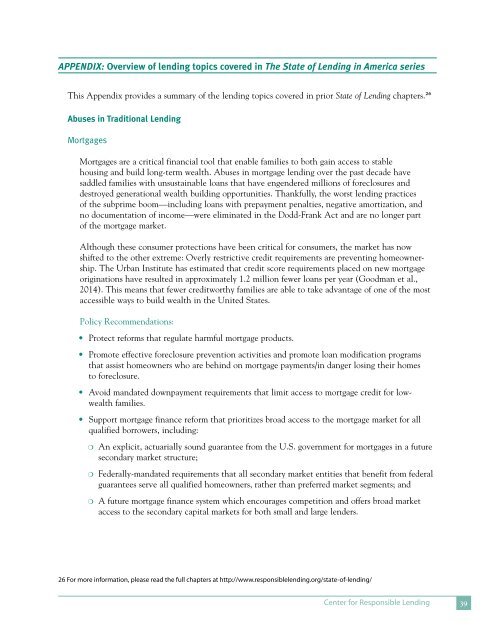Create successful ePaper yourself
Turn your PDF publications into a flip-book with our unique Google optimized e-Paper software.
Appendix: Overview <strong>of</strong> lending topics covered in <strong>The</strong> State <strong>of</strong> Lending in America series<br />
This Appendix provides a summary <strong>of</strong> the lending topics covered in prior State <strong>of</strong> Lending chapters.26<br />
Abuses in Traditional Lending<br />
Mortgages<br />
Mortgages are a critical financial tool that enable families to both gain access to stable<br />
housing and build long-term wealth. Abuses in mortgage lending over the past decade have<br />
saddled families with unsustainable loans that have engendered millions <strong>of</strong> foreclosures and<br />
destroyed generational wealth building opportunities. Thankfully, the worst lending practices<br />
<strong>of</strong> the subprime boom—including loans with prepayment penalties, negative amortization, and<br />
no documentation <strong>of</strong> income—were eliminated in the Dodd-Frank Act and are no longer part<br />
<strong>of</strong> the mortgage market.<br />
Although these consumer protections have been critical for consumers, the market has now<br />
shifted to the other extreme: Overly restrictive credit requirements are preventing homeownership.<br />
<strong>The</strong> Urban Institute has estimated that credit score requirements placed on new mortgage<br />
originations have resulted in approximately 1.2 million fewer loans per year (Goodman et al.,<br />
2014). This means that fewer creditworthy families are able to take advantage <strong>of</strong> one <strong>of</strong> the most<br />
accessible ways to build wealth in the United States.<br />
Policy Recommendations:<br />
• Protect reforms that regulate harmful mortgage products.<br />
• Promote effective foreclosure prevention activities and promote loan modification programs<br />
that assist homeowners who are behind on mortgage payments/in danger losing their homes<br />
to foreclosure.<br />
• Avoid mandated downpayment requirements that limit access to mortgage credit for lowwealth<br />
families.<br />
• Support mortgage finance reform that prioritizes broad access to the mortgage market for all<br />
qualified borrowers, including:<br />
m An explicit, actuarially sound guarantee from the U.S. government for mortgages in a future<br />
secondary market structure;<br />
m Federally-mandated requirements that all secondary market entities that benefit from federal<br />
guarantees serve all qualified homeowners, rather than preferred market segments; and<br />
m A future mortgage finance system which encourages competition and <strong>of</strong>fers broad market<br />
access to the secondary capital markets for both small and large lenders.<br />
26 For more information, please read the full chapters at http://www.responsiblelending.org/state-<strong>of</strong>-lending/<br />
Center for Responsible Lending 39


